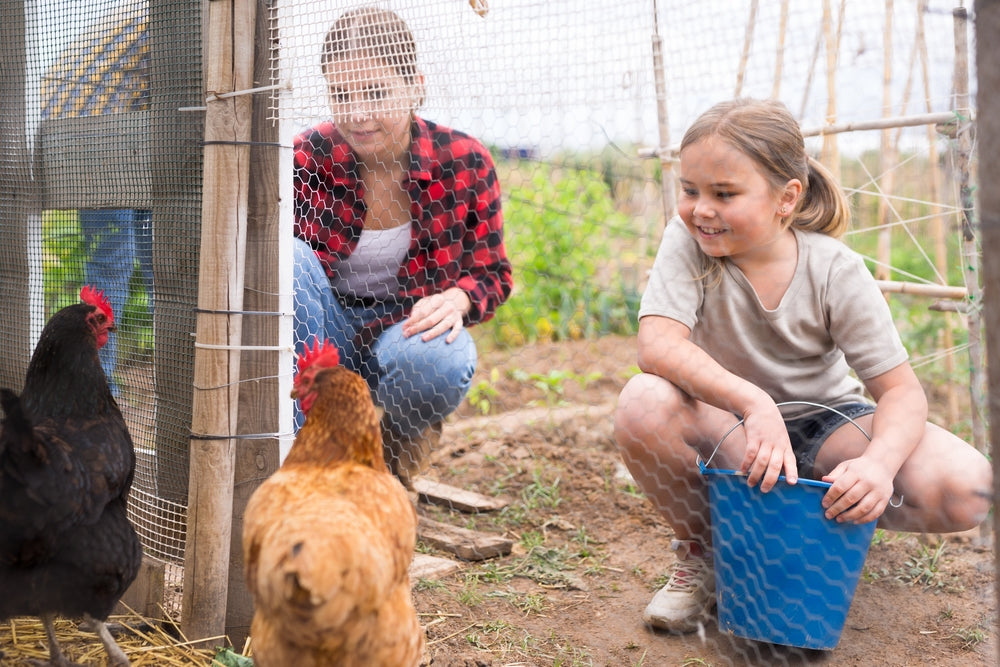
How to Start an Urban Homestead
Homesteading isn't just for people with acres of land or a farm handed down through generations. It's entirely possible to successfully homestead — growing fruits and vegetables and even keeping livestock — in an urban setting. Let's look at a few of the easiest ways to start an urban homestead.

1. Do your research first.
Even if you think urban homesteading is a great idea, your city or HOA might have other thoughts. There may be restrictions regarding the smells, sounds and sights that come along with homesteading, in addition to restrictions on the animals themselves. That said, the movement towards locally grown food is strong, and many people like the idea of making cities greener, both literally and figuratively.
2. Consider raised garden beds.
A large garden might be out of the question when outdoor space is limited. But you might be pleasantly surprised by how much produce you can grow in just a few raised beds. The advantage of raised beds is that you can develop quality garden soil, eliminating the need for a rototiller. More benefits: raised beds are easy to weed, tidy, retain heat better than ground soil, can help keep rabbits out, and are adaptable to an urban environment — they can be any size you need!
3. Experiment with container gardens.
Some apartment or condo dwellers may prefer an alternative to raised beds. It's easy to grow fresh veggies in smaller containers — garden supply centers offer a variety of pots and planters in an array of sizes — a perfect way to start an urban homestead for beginners. Some vegetable plants thrive in containers, and you can easily grow carrots, peppers, radishes, lettuce, some tomatoes, all the herbs you could ever want and plenty more. Even large crops like potatoes aren't out of the question.
You can grow strawberries in containers and even small citrus trees if you live in a southern climate. The investment is small, but the rewards of fresh food are great. Any food you grow on a balcony or yard is food that doesn't have to be shipped to a grocery store, limiting carbon footprints. South-facing decks and balconies work best.
4. Create a compost pile.
Plants use soil for support and nutrients. But soil wears out over time as nutrients deplete. Large farms might turn to synthetic fertilizers to solve this problem, but you can easily do it in a green way on a small scale with a compost pile (even a countertop variety!). It's really a win-win: you keep organic materials like leaves, grass clippings, veggie cuttings, eggshells, coffee grounds and shredded paper out of the trash bin and use free micro-bacterial action to convert it right back into the perfect garden soil additive.
5. Participate in a community garden.
Your larger gardening ambitions — those that can't readily fit in your yard or on your balcony — can be explored using local community gardens. These wonderful public projects allocate garden bed space to interested participants. While you're responsible for the planting and care of your plot, common infrastructure like a water supply and fencing are shared by users, creating a cost-effective way of gardening on a large scale in an urban environment. Check your city's website to see if a community garden is an option in your hometown.
6. Get poultry.
Chickens. Even a modest backyard could house a small flock of chickens. As long as you aren't limited by local ordinances (be sure to check this out first), you might be able to keep enough hens to provide eggs for your family and friends. Look past industrial chicken breeds and consider heritage poultry breeds developed for a mix of hardiness, egg production and suitability to your specific climate.
Start with a brooder for raising the chicks, and you'll soon move to a coop and enclosed run. These are essential in an urban situation, where you need at least 10 square feet of outdoor run space per hen. Add some chicken waterers, deicers for the winter, and perhaps install some heat sources like a chicken warming plate or heated perch in the coop, and you'll quickly be on your way.
Ducks. Ducks are another urban possibility, but you need larger grassy spaces for them to roam. They require daily filling of their duck feeders and waterers and an ice-free water source for enjoyment.
Quail. If chickens or ducks aren't in the cards, but you love the idea of birds, quail might be an excellent alternative. As a smaller bird, they require less space, and they aren't quite the noisy individuals that chickens are, which could be appealing to your neighbors. Quails are interesting birds, and their eggs — while smaller than chicken eggs — are absolutely delightful.
7. Try honey bees.
You might not immediately think of honey bees as good candidates for farming in an urban situation, but honey bees are a fantastic way to get into “livestock" farming on the smallest scale possible. The space required for honey bees is very small, and modern hive designs promote using vertical space, which is perfect for an urban setup.
Bees also eliminate the need for larger acreages that traditional livestock like cattle or sheep require, as honey bees travel miles to find blossoms. They happily “graze" even if it's not on your property, though you may want to plant flowers and flowering vegetables for their sake.
After a solid summer of foraging, bees generally produce far more honey than they need for overwintering, supplying your family with a fresh, locally sourced treat. Honey bees are also critical to crop pollination, so keeping bees helps the world. Beekeeping is not without its share of chores (there will be frame boxes to add, queens to monitor, feeders to stock when nectar sources are scarce, and a water source to provide), but the chores aren't daily, and they're easy to fit into a busy schedule.
Starting an Urban Homestead Doesn't Have to Be Difficult
Starting an urban homestead in your backyard or on your balcony can be an easy and rewarding experience. Besides enjoying the "fruits" of your labor, small-scale homesteading gives you a chance to experience deep connectivity in a way that's often missed in modern city life. You connect more with the food you eat (hey! I grew that!) and the animals you raise (these eggs came from my chickens). And if doing this with your family, you get the opportunity to build deep connections with each other and potentially teach the next generation how to maintain a homestead in their own backyards.


